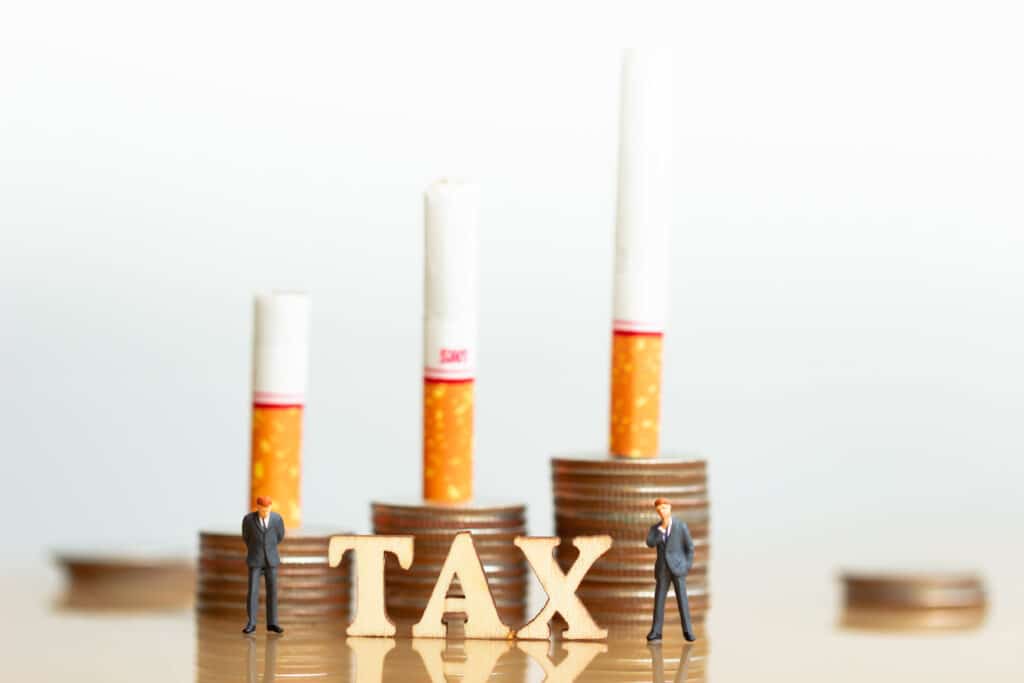If the idea was really to help people stop smoking, then that’s what we’d see; products pushed to reduce smoking and government policy to match. But we don’t in the US. In fact, it’s quite the opposite. With literally zero death toll for vapes, the US keeps going after companies that provide smoking alternatives. Between Juul and now Elf Bar, it seems the US government wants people to vape less and smoke more.
*This article is the opinion of the writer concerning recent events carried out by the US government to warn retailers against selling Elf Bar products.
What is Elf Bar?
With the tagline ‘Make it Elf, enjoy yourself,’ Elf Bar is a company that sells nicotine vape products. The site makes it sound like some kind of religious experience, which is a bit much. But the reality is that it offers decent vape devices that keep people away from smoking cigarettes. Elf Bar is a Chinese company owned by iMiracle Shenzhen.
The company provides a variety of disposable and refillable pods, both in regular pod-shape style, as well as cigarette style. The disposable market is much bigger, at least when looking at sheer offerings. The idea that so much is disposable, does go out of line with the company’s oft mentioned desire to “support the development of a sustainable and prosperous society,” in its own words.
However, I also understand that curbing already existent behavior and markets is difficult. So perhaps when they say, “We are committed to continuously improving our business activities and achieving the highest standards of environmental sustainability,” it might be true in terms of future goals.
A little jaunt onto their site shows huge warning signs for nicotine, and the statement that nicotine is an addictive chemical; Elf Bar products similarly have warnings. The company seems to be in line with regulation concerning the advertising and sale of nicotine products. The company also has its own programs meant to keep those under 18 away from nicotine. However, having said that, and as a supporter of anything that helps people stop smoking; its hard to take a ‘no-nicotine’ campaign seriously for anyone, when the company doing it, is in the business of selling nicotine.
This is a good time to remind that nicotine isn’t the issue in smoking, not really. Smoking is the issue in smoking. Lighting something on fire and breathing it in. Tobacco was used medicinally in history, and wasn’t associated with the problems of today until it started being smoked. The reality of smoking is that its smoke inhalation, and smoke inhalation is the ultimate culprit. That means anything smoked, from cannabis to tobacco to other herbs, poses the same risk. Smoke itself is the problem. If you’re breathing in smoke of any kind, its smoke inhalation.
This is something constantly confused in the news and media; whether on purpose, or accidentally from bad marketing lines over the years. So much so that the average person seems less aware of the issue of smoke, and is instead afraid of nicotine. In reality, any product that keeps a person from actually ‘lighting up’ *should be considered good. Or at least, it should be if its not associated with any other health issues. Vaping is not, so long as bad additives aren’t used.
Elf Bar and the US government
The FDA recently sent warning letters to as many as 189 retailers, imploring them to stop sales of Elf Bar products. The letters go out because these are considered unauthorized products; as in, sold outside of government regulation. This also implies the government cannot fully tax the products; and therefore makes less revenue than it does for approved products.
The US recently implemented the Family Smoking Prevention and Tobacco Control Act (TCA), a law which requires FDA approval to legally sell products. This was implemented to try to curb illicit markets. The FDA says it went after Elf Bar because the company has no current authorization, or a pending one with the agency. Apparently, the federal government reviewed data which showed Elf Bar as one of the most popular vape brands in the US; and voila, letters to stop sales.
According to ABCNews, FDA Tobacco Center Director Brian King stated in an interview, “We’re not going to stand by as bad actors are profiting off the sale of illegal products that are addicting our nation’s youth. Today’s action is just part of our long-standing efforts to address those products, particularly flavored disposable products.”
Despite these kinds of actions, and everything against Juul, the illicit vape industry continues to thrive. ABC gives some other statistics. It says that the number of e-cig brands jumped from 184 to 269 from 2020 to 2022, in the US. And that the disposable vape market went from 24.7% of the overall vape market in 2020, to taking up 52% of it in 2022.
The same article brings up that both the FDA and CDC mention a report related to poison control centers, and that they received more calls involving children (mainly under five). ABC gives no report name, or link to a report. This is odd, as its the one point of danger so far possibly related to these products. A small child might be at a higher risk for swallowing something down that they shouldn’t; although how a vape cart fits in, is questionable at best. A child is probably more likely to eat a cigarette, than smoke a vape cart. Kids also accidentally swallow down medicine cabinet pills and cleaner under the sink. Just saying.
While there is no citation given for any of this, the article claims that government scientists claim that emergency room calls went up 30% in a year. It says nothing about who tabulated the info, whether these calls involved anything besides nicotine, or how the nicotine was ingested (if any of this is real). It stipulated that in 95% of cases, no brand information was included. You’d think there’d be a host of statistics. Instead its just ABC News talking about something for which it doesn’t give supporting evidence.

How this resembles Juul
About a year ago, the US government banned some Juul products. It did this without removing cigarettes from shelves. Before getting into anything else, this is a massive contradiction that deserves way more attention than it gets. If Juul, or any vape device is that dangerous – even without causing direct deaths, then cigarettes should *automatically be banned for their known death toll. How much of a death toll? 480,000 people a year, according to the CDC itself; with 41,000 of those deaths from secondhand smoke.
Juul, as the first big company to offer these vapes, weathers the brunt of the storm. I always like to point out that Juul isn’t associated with even one death or injury suit. It’s railed against because of what’s called a ‘vape epidemic,’ which is laughable at best, as it translates to an ‘epidemic of people not smoking anymore.’ While cigarettes stay on shelves, Juul is treated as though its pushing hard drugs on babies; when in actuality its giving a way to get away from death-causing smoke.
Despite logic, Juul has a ton of lawsuits against it under the argument that it advertised to people under 18; never mind that no one got hurt. There is not one death or injury case, just cases over marketing practices. The company has complied with regulation for quite some time, so these are old issues to begin with. Couple that with the pesky issue of not causing any health problems thus far, and the whole thing gets logically weird. Vaped nicotine isn’t the same as lighting it on fire; just like any other material.
Again, despite logic, Juul recently settled a spate of lawsuits in which it must pay out to several states to the tune of $462 million dollars. Juul has now settled with 45 states, for a total of about $1 billion. So not one death or injury case, and helping people quit smoking; and yet lawsuits to pay out around $1 billion. It also has a host of other stipulations it must adhere to surrounding how it markets products, and the age of those allowed in advertising. Yet not one death.
Perhaps it makes sense that Elf Bar is the new target. The US and state governments have done a lot to limit Juul, both financially and legally. But the way life works, there’s always something new coming into town. The US isn’t against Juul or Elf Bar specifically, not really; its against markets it can’t control. Governments will never be okay with these products if they’re not approved; and therefore not subject to US tax laws. Elf Bar is simply the next in line.
Why is the US so against vaping??
The US government sure likes to talk about the dangers of smoking. So much so that it could ride the wave of lawsuits against cigarette manufacturers, and then exorbitantly tax the products. This move is seen all over the world, along with a general detraction of vapes; despite no real and direct injury attached. Massive deaths with smoking, none with vapes; yet an atmosphere where we’re constantly told the non-dangerous option, is too dangerous. What happens when you block one option? You encourage another. If people can’t vape, they’ll just smoke. And maybe the US likes that, for taxes.
It’s done through the idea of ‘sin taxes,’ or taxes put on products that are unhealthy or can cause societal harm. Alcohol gets this tax, and cannabis (though its generally absurd in that regard). These taxes are imposed like excise taxes. The end consumer won’t see them at the register, but they’re embedded in the overall cost of the product.
How much of the cost of cigarettes goes to government bodies? It depends on location. Some countries are worse than others. For example, Mexico has a 70% tax on cigarettes. In the past, the UK had even higher taxes of as much as 82.16%. According to TaxFoundation, in the EU, the average cigarette tax was 80.4% of the total cost of the product in 2021. In 2019 alone, the US collected $12.9 billion in cigarette taxes according to Taxpolicycenter.org.

That money is collected via the Federal Tobacco Excise Tax. In 2021 this number was $12.4 billion (Statista), and its predicted to be $11.28 billion in 2027. That’s not a huge drop expected for a country that preaches how smoking is bad. Probably because regardless of what it preaches, it keeps trying to banish other options.
The US is constantly trying to get in the way of you and any attempt to actually quit smoking; sometimes in horribly backhanded ways. Like a story last year about Biden wanting to lower the amount of nicotine in cigarettes. That might sound nice, but aside from a curated piece of research from one time that made it look like this reduces smoking, its been shown repeatedly to increase it.
The FDA also quickly nixed nicotine gummies, an offering that could save people from the dangers of inhaling smoke, by providing an edible product. It gave a weird line at the time of not wanting to confuse children. Which is odd considering how easily a child can be confused by a can of beer and one of soda. The federal government even attempted to institute a vape mail ban; which luckily seemed to be hated enough (and destructive enough to delivery companies) that it was dropped, and essentially forgotten. In all this time, no useful alternatives were offered.
If the idea was really to get people to stop smoking, at the very least, the US would act more like the UK. The UK is instituting new policy to help people switch from smoking to vapes. Part of which involves getting vapes to people like pregnant women. That country too has a huge illicit vape market, and this is likely meant to curb it more than anything else. If the government sells the vapes, it gets the money, not an illicit provider. At the very least this means attempting to switch its revenue stream from cigarettes to vapes. Still not about a love of people, but at least more useful to the population.
Conclusion
Is Elf Bar some horrible company out to kill people? No, doesn’t seem like it. It just seems like the next company to get one over on the US government. As such, the US government is putting all its effort into stopping the company; and all while seemingly blocking every smoking alternative for its people. My bet is that if this doesn’t work, it’ll resort to China scare tactics; whatever it has to do to protect its cigarette tax revenue.
Welcome readers. Cool that you’re joining us at Cannadelics.com, where we offer up independent news coverage of the cannabis and psychedelics worlds, and well beyond. We want to keep you updated, so come ’round regularly. And subscribe to the Cannadelics Weekly Newsletter, so you’re always on top of what’s happening in the world.





